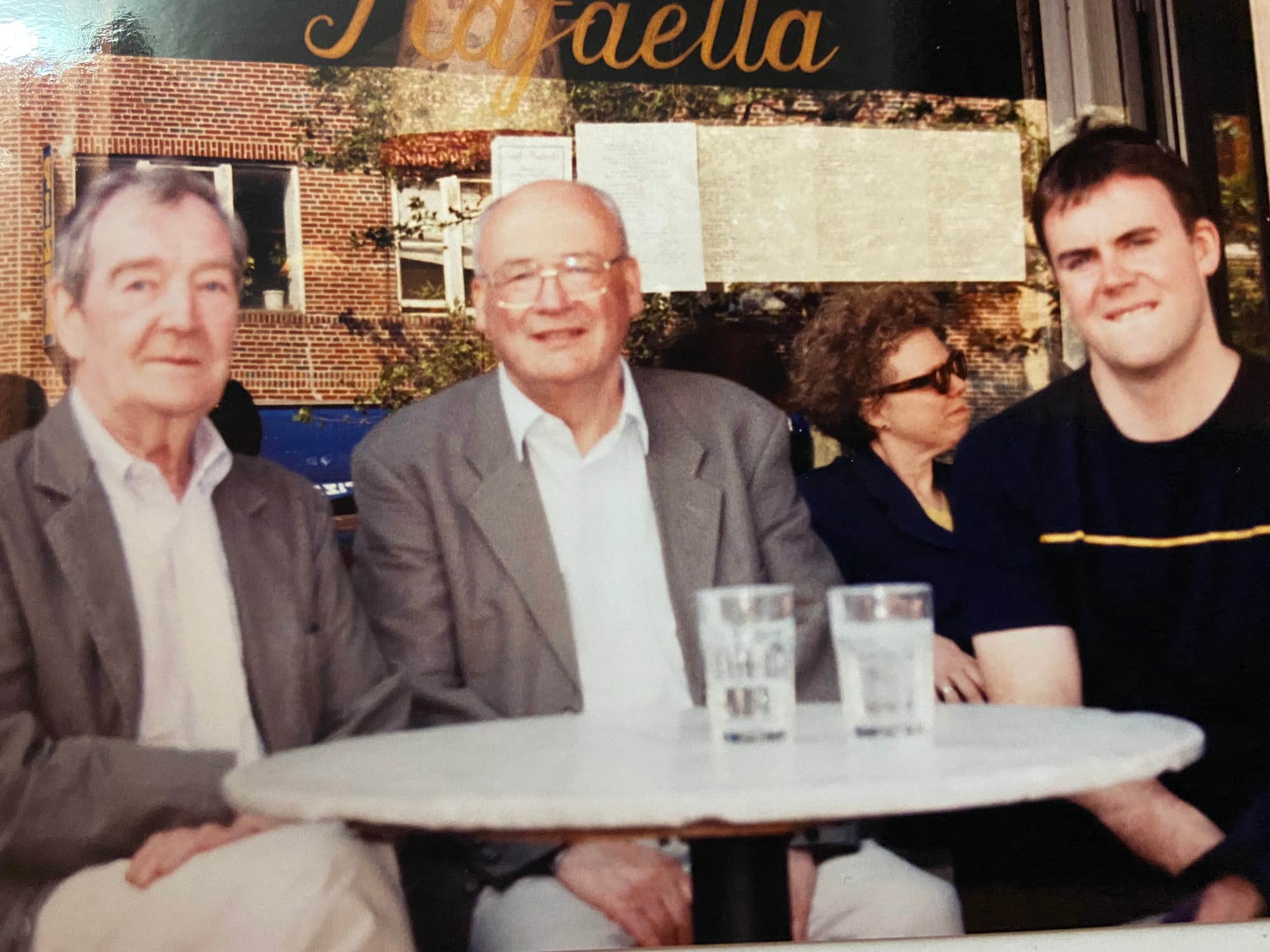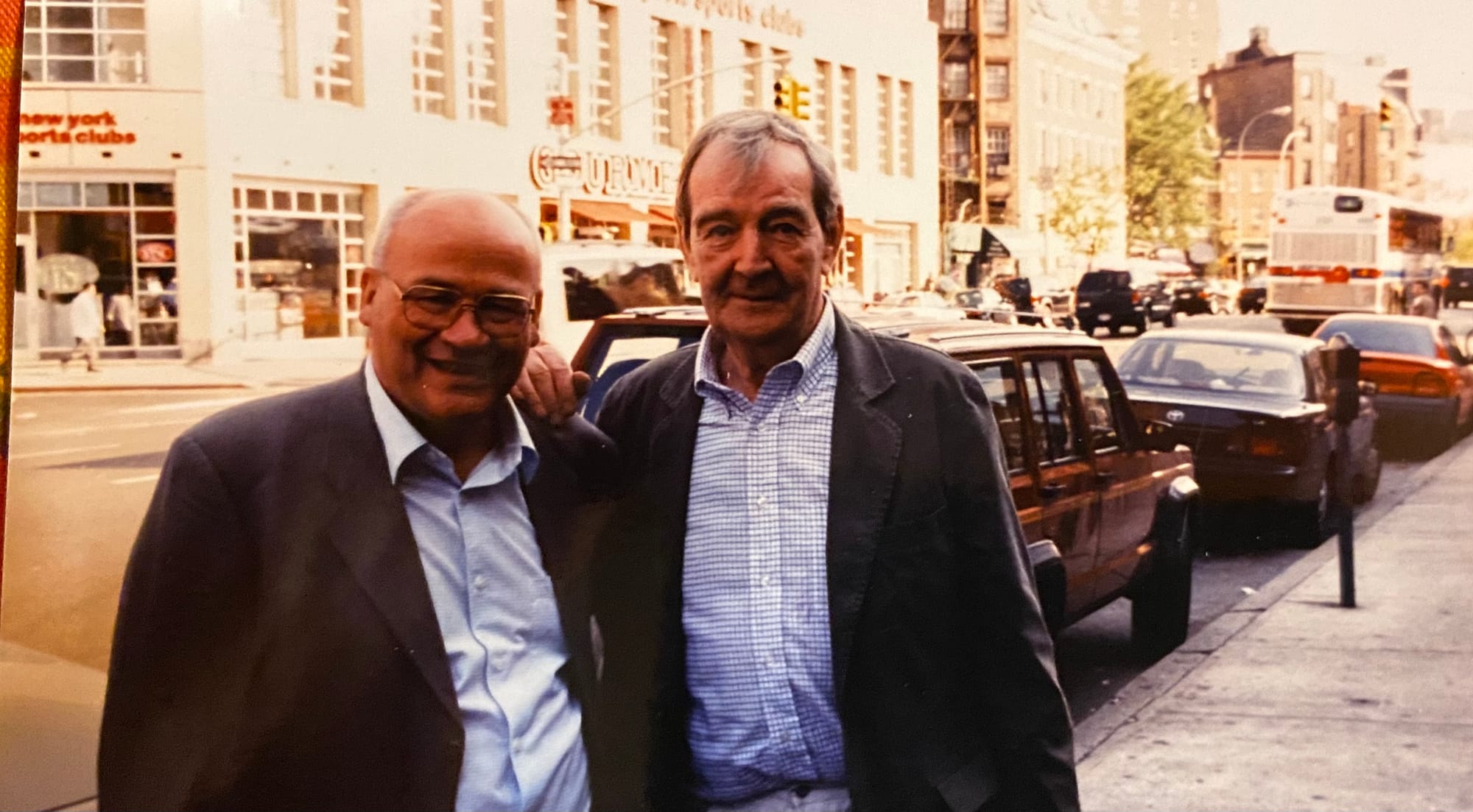On Meeting Alastair Reid.
The story of when my uncle, the late Dr Finlay Macleod and I spent three days in New York with the Scottish writer Alastair Reid.
"To speak two or three languages is to have two or three totally different selves, like odd suits of clothing... Some fit more easily than others... for a writer, it is an invaluable holiday to speak, in the course of the day, a language other than the one he writes in.” from ‘Whereabouts’ by Alastair Reid.
My uncle the late Dr Finlay Macleod and I spent three days in New York once, filming a documentary with the writer Alastair Reid. Both Finlay and Alastair were very influential for me. Alastair passed away in 2014.
Finlay was the first person to encourage me to write something. He had one of the first Macintosh computers, still a fine design and so exciting to be near at the time. I would sit in his study and write stories. Or rather, he'd say 'go and write me a story’.
Finlay was a writer - plays, children's books and non-fiction among other things. When I was a young, I was playing in his house and I found a cupboard full of fresh books. It was a play he had written in Gaelic called ‘Na Balaich air Rònaidh/The Boys on Rona’. The cover was white with black text. They were stacked so perfectly, they looked so perfect. I remember thinking, I'd like to make a book like that.
In 1999, Finlay and I filmed a documentary together with Alastair in New York. In one way, it is a long time ago. But I can recall some moments from those days as clearly as last week.
Alastair born in Galloway. He was a son of the Manse, and had been in the Navy during the war. It was then that he learnt that there were many different ‘ways of being’. His only real constant point of contact was an office in the New Yorker magazine.
After the Navy he went to Spain and learnt Spanish.
“It was at this point, in the early fifties, that I stumbled on Spain - not by design, since I knew not a word of the language… I was drawn in by a certain human rhythm.” (From “Digging Up Scotland”.)
He had a house in Deià in Mallorca and was friends with Robert Graves. Alastair took the saying to heart that ‘writing is the most portable of professions’. When I met him, he had a suitcase of belongings and a shelf of books. He moved when it suited him, living in Spain, in Scotland, in New York and in the Dominican Republic.
He wrote of what it is like to be a foreigner in a different country. Not a tourist, a foreigner. He also wrote often about living and writing in two languages – for him, English and Spanish.
“… even when we have mastered a language sufficiently well, it keeps trapping us, refusing to allow us to finish a train of thought by deserting us suddenly, making fun of us by coming out wrong The language we grow up with is our servant: we are always a step ahead of it. A new language, however, already exists: we have to grasp hold of it by the tail, and are never wholly sure where it will take us.” from “Notes on Being a Foreigner” (paid link).
He spoke eloquently about Calvinism and named things which I knew but had not made sense of. His essay ‘Digging up Scotland’ is wonderful.
“When I go back I am always trying on the country to see if it still fits, or fits better than it did…Still, the landscapes of my childhood are irreplaceable, since they have been the backdrops for so many epiphanies, so many realizations…” From “Digging up Scotland”.
I was twenty six when I met him and he was just the right person to meet as I was planning to go around the world for a year, stopping in South America as part of the trip.
He had taken a trip from New York in a ship once, he told me, stopping at different ports and cities in South America and meeting writers. He translated the poetry of Jorge Luis Borges and Neruda and been involved at the start of the flowering of South American novelists like Gabriel García Márquez (He read a printout of an early draft of ‘100 Years of Solitude’) and Mario Vargas Llosa.
I wrote down some journeys he suggested through South America. One in particular was crossing the Andes to go from Puerto Mont in Chile to Bariloche in Argentina, three ferries and three buses. I did this journey. I also went to Neruda’s house in Santiago and to the cafe that Borges used to sit in, in Buenos Aires.
On our final night together there was a thunder storm. Alastair was staying in Greenwich Village at the time. The lights went out and we shared a bottle of whisky we had brought over from Scotland. I listened to Finlay and Alastair talk for hours about writers, from Carpentier to Neil Gunn, from Pablo Neruda to Malcolm Lowry.
On the way back to the hotel in the taxi, Finlay said to me - “You need to know more. You need to read more.”
Most of the time, you have no idea how important something is when you are in the middle of it.
I corresponded with Alastair after that - sending letters to his office at the New Yorker and receiving letters back periodically from wherever he was in the world. In his letters, Alastair said he often thought of Finlay, walking on the beach in Shawbost.
Not long after returning from New York to Lewis, I was talking to one of my neighbours. It was a beautiful day on the island. I mentioned this and he said ‘We’ll pay for it’.
I thought of Alastair and skipped down the street.
SCOTLAND by Alastair Reid
It was a day peculiar to this piece of the planet
when larks rose on long thin strings of singing
and the air shifted with the shimmer of actual angels.
Greenness entered the body. The grasses
shivered with presences and sunlight
stayed like a halo on hair and heather and hills.
Walking into town, I saw, in a radiant raincoat,
the woman from the fish-shop. ‘What a day it is!’
cried I, like a sunstruck madman.
And what did she have to say for it?
Her brow grew bleak, her ancestors raged in their graves
as she spoke with their ancient misery:
‘We’ll pay for it, we’ll pay for it, we’ll pay for it!’

